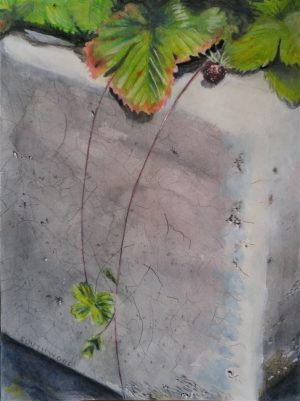Boris Johnson, COVID-19 and Oedipus Rex – part 1
The 2,500-year-old tragedy of Oedipus continues to be played out: Boris Johnson’s literal and unimaginative response to COVID-19 has not moved on.
This is a piece about melancholy. These days we call so much psychological suffering depression, losing subtlety and even accuracy. Melancholy deserves to be restored as something of importance. But this culture holds sadness in contempt.
For perspective, some time back I wrote a piece about depression (you can read it here). In it, I suggested that by being in nature we can honour our depression rather than attacking it. This isn’t about ‘cure’, or a moral injunction (“go and have a good walk, that’ll do you good”), it’s about valuing oneself in different ways. Once again James Hillman is our reliable psychopomp:
Depression tends to make you focus on yourself. The very focus on oneself that we do in therapy is, per se, a depressive move. Therapy could be causing depression as much as curing it, because the classic symptoms of depression are remorse, a concentration on oneself, repetition – “What’s wrong with me? How did it get this way? I shouldn’t have done that.”
Feeling broke and poor and without energy – in other words, a withdrawal of libido from the world. The moment you’re focusing back on the world as dysfunctional, you’re drawing attention to the world. That’s not depressing.
James Hillman and Michael Ventura, We’ve Had a Hundred Years of Psychotherapy – and the World’s Getting Worse, 1993
Hillman suggests focusing on small tasks, just as a volunteer will clean the foreshore of plastic rubbish. The story of the forest fire and the hummingbird told by Kenyan environmentalist Wangari Muta Maathai is a great illustration of this.
Social media is full of highly defended advice for the depressed to get out and get active, go running or kayaking or whatever. Even going for a walk is sometimes impossible. But I believe the first step back from melancholy is to recognise that Saturn’s perspective (“What’s wrong with me? How did it get this way? I shouldn’t have done that.”) is just one of many. Here are Hillman and Ventura in dialogue from the same wonderful book I quoted from above:
Ventura: […] all this dysfunction doesn’t personally depress me because it gives me a lot of room to maneuver in, an awful lot of room to maneuver in.
Hillman: Right. It says, off the bat, “I’m not neurotic.” That’s a huge relief.
Ventura: “I’m not neurotic, this is not my fault, and it’s not my family’s fault either.”
Hillman: “the world-soul’s sickness is announcing its despair through me.”
Ventura: “But I’m not a victim, because this is the sweep of history and I’m a participant.”
Hillman: Which also means, “I’m also not the healer.”
Ventura: “Putting it all right is not my job” – which is another lightening of the weight, more room to maneuver in.
James Hillman and Michael Ventura, We’ve Had a Hundred Years of Psychotherapy – and the World’s Getting Worse, 1993
So it’s possible to put down much of the weight of the dysfunction, but without giving up. That leaves us with the personal. Sometimes you can’t do anything for yourself, nothing works. The key is acceptance, to allow the weight to almost crush. Go to bed, cover up, whatever feels safe, but hold in your heart the idea of the world-soul, that it’s there and waiting for you, and even if we have made it sick it is still powerful. What follows is a moment, an expression, of honouring melancholy. It is not a recipe or a template.
Today I took a walk because the sun invited me. At other times I might refuse the invitation: I might be busy or unwell or just not feel like it. Today I accepted: it felt right. The place is Battersea Park by the Thames in London, a mid-Victorian amenity, once quite famous, now rather shabby at the edges. It used to host a supervised adventure playground that was demolished by Wandsworth council, but not before it was occupied and became, briefly, famous once more.
My purpose today though was political in the broader sense, to connect with the world-soul, and here I invite you to keep me company.
I don’t want to walk down a main road so I take the bus for a few stops and enter through the north western gate. On the lawn of the gatekeeper’s cottage there are yellow crocuses. They don’t look too bad – normally I don’t care for them much, they are so prone to damage from rain/wind/dogs, but these shine in the sun.

I’m in the vegetable garden now, Thrive run it. There’s a robin singing on a tree as I enter, an announcement and a warning. This is its tree, and its call is echoed by another robin nearby. I won’t see many species this morning because there are other people here. A few days back I stood very still by the decking area, and watched as birds darted back and forth to feed on seeds that had been left under the walnut tree. Long-tailed tits perched above my head. A nuthatch, sleek and slate grey elegant, decided that my presence was an acceptable risk. That’s pretty much all one has the right to expect of other animals.
The vegetable beds are prepared for the Spring. They are composted, mostly bare except for some onions, but dug beautifully and pregnant with purpose. I want to grab a big double handful of that good earth and press my face into it. I examine the asparagus bed, decorated with a few spindly brown fronds from last year. The first spears won’t start to poke up their heads until April, but it gives me such pleasure to see the dormant mound, a reminder of the ‘Battersea Bunches’ that were grown when market gardens were here, on land ‘reclaimed’ from the Thames. Wait, there’s something new here, a new space penetrates the bed of plants for women’s health. Is the ‘path’ a figure? A keyhole? A vagina? Now I’ll be able to see the plants more clearly. A wren appears, flicks its tail, disappears into cracks in the fence, hunting for spiders.
A short walk takes me to the Old English Garden. The pond has been emptied for cleaning and the isolated water lily pots look vulnerable and forlorn. A mound of green blanket weed has been heaped to the side. I look at the wisteria and notice the trunk for the first time. It seems to writhe and twist around a youth carrying a bundle of rushes, and I think of how we stand in the field of each other’s projections, rarely connecting with the other. I see the heads of monsters and damned souls, but when do I see the plant, its age, its struggle to the light?

A rustle, a darting shape, jittery, pecking – it’s a hedge sparrow. It is generally described in bird books as ‘promiscuous’ in its mating habits. It is as if the authors were entirely unconscious of ascribing their own values to a different species. This little brown and grey bird is so beautiful. Because of its colouring, it is rarely seen – but the vegetative cover that conceals it for most of the year has not yet grown. And the song is a delight, the rapid modulation impossible to follow.
I stand and listen, half-awake, conscious of two homeless people who have slept here. I see many of the homeless in Battersea with suitcases now, as if they are stopping for a rest after getting the train back from Gatwick. Perhaps that is sometimes true, the last fifty quid spent on an Easyjet break. Things might seem better outside the trattoria, a glass of water with the coffee, sipping Cynar, feeling as if good things might happen. Then the return, the locks changed, the hope gone. The suitcase suggests a temporary homelessness. The surroundings an embarrassment, as if we should understand that the sleeper is really at work. “Just off for the corporate bonding weekend in Bergamo.” How transient our pleasures are these days. I have been to this park and walked for an hour and in that time I have seen not one person walking for the sake of it, but dozens either with dogs or running (sometimes running with dogs).
Delighted by the hedge sparrows (also called dunnocks), I start to think of house sparrows (the dunnock is an Accentor). Twenty years ago, the sparrows seemed to disappear from London almost overnight. About ten years later I went to Guernsey and found two trees in St. Peter Port full of sparrows. It seemed as if every squabbling sparrow in London had fled to these two magical trees, and there they stayed in conference until quite recently, safe by the sea. And I am reminded of how sparrows are connected to Aphrodite, because of their supposedly lascivious nature, and how we continue to split mind and instinct, to deny the erotic in nature.
I walk towards the strange relics of the Festival of Britain, surprised as always that they are still there and not blown away. At the coffee kiosk, women and dogs sit together, humans and canines about as different in their respective physiologies as possible. I get the feeling that none of the dogs looks happy, nor do their owners. Dolorous hounds sit next to twitching chihuahuas. A neurotic Pomeranian scratches a flea bite with a bony hind leg like a chicken wing. Does its silly dainty face dream of loping through the snow with the wolf pack, nostrils full of the smell of fat and warm fur?
A miniature pug has escaped and is in hiding. A large woman calls for it, but it stands there trembling slightly, its red lead trailing behind it like blood. “There you are. You little tinker,” she says indulgently as she gathers up the trail of blood. The pug snuffles: I wonder what it feels as it looks up at her with its black eyes, perhaps the half-formed desire to run and hunt mixed with fear of the giant world, and the pull of the warm carpet and this comfortable woman shaking the packet of dog biscuits, teasing, holding the power. I buy coffee and sit in the sun with it, away from the scratching bickering dogs, my face held back, feeling the warmth, wrapped in my comfortable fleece, dreaming of my own running and the fears that keep me enslaved.
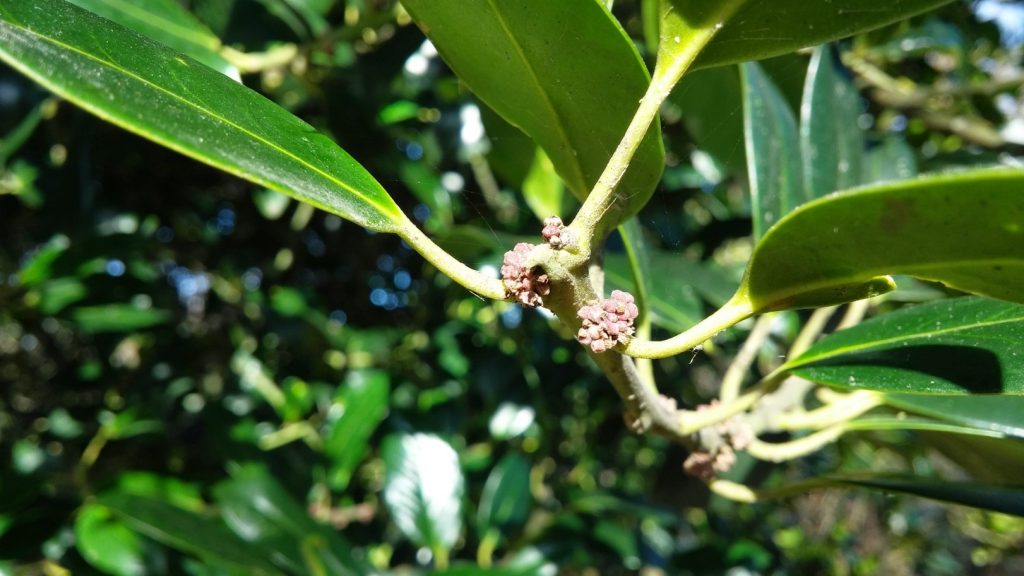
A family arrive. Mum, dad, two girls and a boy. They’re looking for something, talking in a language I don’t recognise, one of the Baltic languages perhaps. The girls sound bored and whiny. The father doesn’t smile I notice, though the mother does, nervously. Someone has impaled a woolly hat on the railings and this appears to be one of the lost items. One of the girls takes it and holds it to her as if it is a thing immeasurably soft and comforting. They look for a few minutes unsuccessfully and the father asks at the coffee kiosk if anything has been handed in. Disappointed, they sit down to coffee and drinks, with much argument and the grating of metal chair legs.
The peace is broken, I finish my coffee and leave. But didn’t I see some clothing by the fountain lake? I walk back and sure enough, there is a child’s coat on the ground. Returning to the family I ask them if they have lost a child’s coat, dark blue I tell them, puffy. “With silver?” the father asks. I tell him I didn’t see any silver but offer to show him. “We come yesterday, have coffee, forget clothes”, he explains. “Easily done”, I reply. I suppose it is, the warmth of the sun after many weeks of winter, taking off the layers that we habitually wear, casting them aside, taking risks. Have coffee, forget clothes. Then the guilty remembrance of the protection that we’ll need, the abandoned parts of ourselves, stolen or sodden with rain. Not looked after.
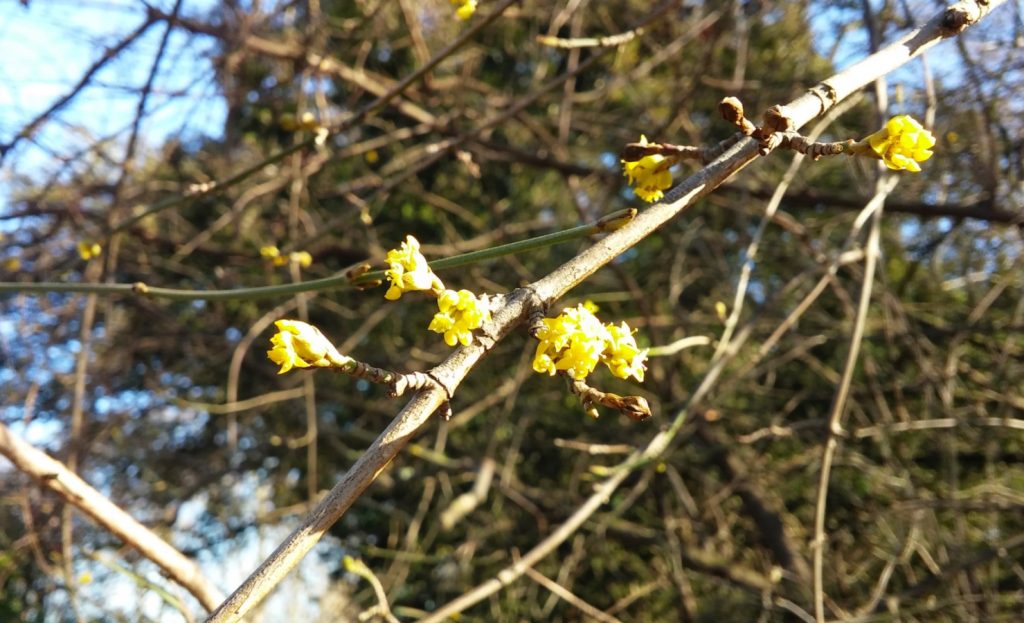
No wonder the girl held the woolly hat so close: when she pulled it over her ears she felt warmer, and the screams of the sirens were muted.
I point out the abandoned coat, lying by the pond like a small twisted corpse, and wondering how it had moved so far. The father grunts thanks and walks towards it with purpose. He still hasn’t smiled. I take a different direction but, looking back, I see him holding the coat as if it might get angry and bite him. Was it the lost garment? Or did it just look to be a good enough replacement? I will never know, but writing about it now it seems important. Would the girl put on the coat with relief and the sigh of contentment that betrays the habitual, the comforting? Or would she reject it, disown it? Would the unsmiling Daddy demand that she take it, the comfort of another? All this I consider as I walk towards the bandstand.
A heap of manure stands in the path. Council workmen are carting it into smaller piles on the flower beds. I remember spreading compost, my back aching, the wheelbarrow handles becoming heavier to lift. I also recall the pleasure as the big mound shrinks and how good the beds look with their brown blankets, the pleasure of spreading the compost, the warm mushroom smell of it. “At least we don’t have to walk so far today,” says one of the workers. In a moment I would have traded places with him. By the end of each day I would be tired, my back stiff and painful, but I could walk away, a job done and the earth nurtured, back to my own nourishment and bed, a gestalt.
Past the bowling green (‘flat shoes only’ a sign says, and for a moment I imagine a group of glam rockers in platform boots, arguing over the rules) and there is the Pump House, now a gallery. I note that there is a new exhibition and as always I hope for something I can relate to. And here is a tree that often seems to be a natural depiction of pain and melancholy. This is the tree I thought of when I wrote this haiku:
Because we’re so fast
We can’t see how a tree writhes.
We think we’re alone.
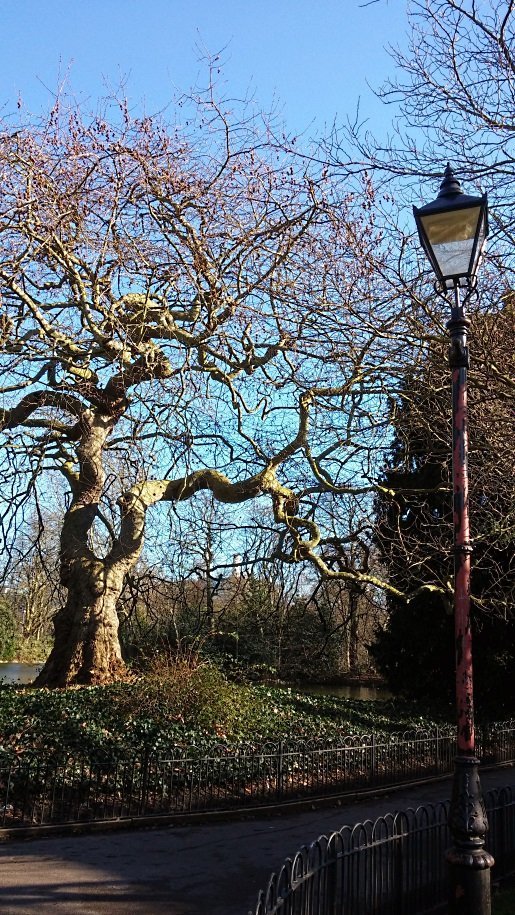
At the ornamental lake the warmth of the late winter sun surrounds me, I’m enveloped in a faint glow and the branches are gilded. I see pochard and tufted duck. There are the resident pair of swans. Not long ago I watched one of their nine almost full-grown cygnets fly up as if it had a fancy to roost in a tree, like one of the rose-ringed parakeets that live here now. At the top of its ascent, it lost control and fell out of the sky like a sack of cement, hitting the concrete path with a horrible slap. It was bruised and clearly shocked, but nothing seemed broken. I remember how hard it was to walk away.
I pass the big hybrid Arbutus and admire the chestnut colour of its bark, and later I see two chestnut spaniels sparring. They lunge and feint at each other, and I am overjoyed to see dogs that are alive, playful and shining. To feel that joy does not mean that my melancholy is ‘cured’. It means that by staying with my felt sense I have allowed other responses, and this is one of them. I hope the importance of allowing melancholy rather than attacking it is clear.
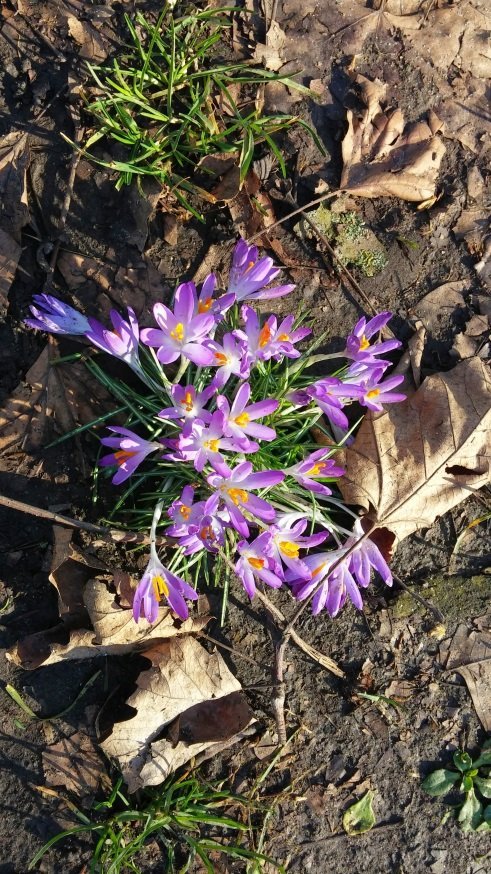
I walk back, passing more crocuses, and these for once are perfect. Leaving the park, my senses heightened, I spot campanula dribbling down the crack in a brick wall.
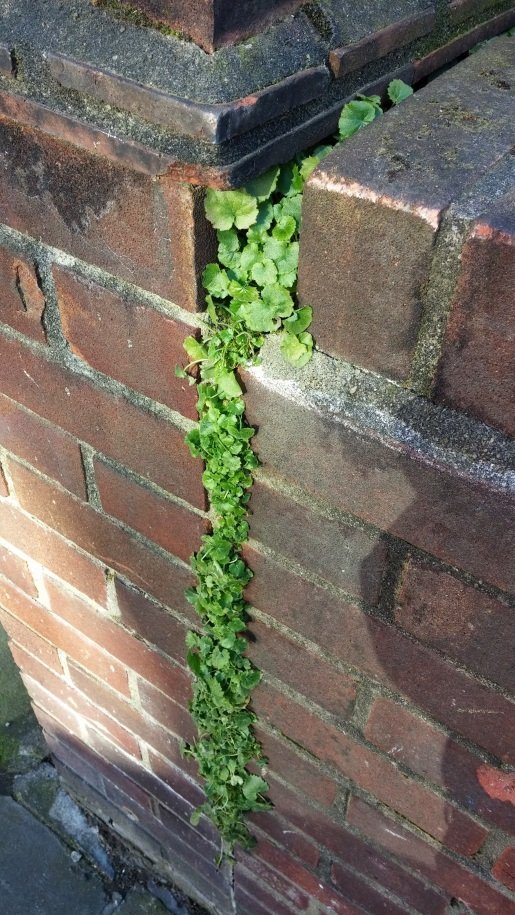
And here is ornamental quince, the white variety, in delicious bud. This walk was blessed. I was able to see beyond the managed urban space to the life beneath, to carry this out with me for a while, to recognise that the world of our creation is more melancholy than I am, and to feel energised for another day.
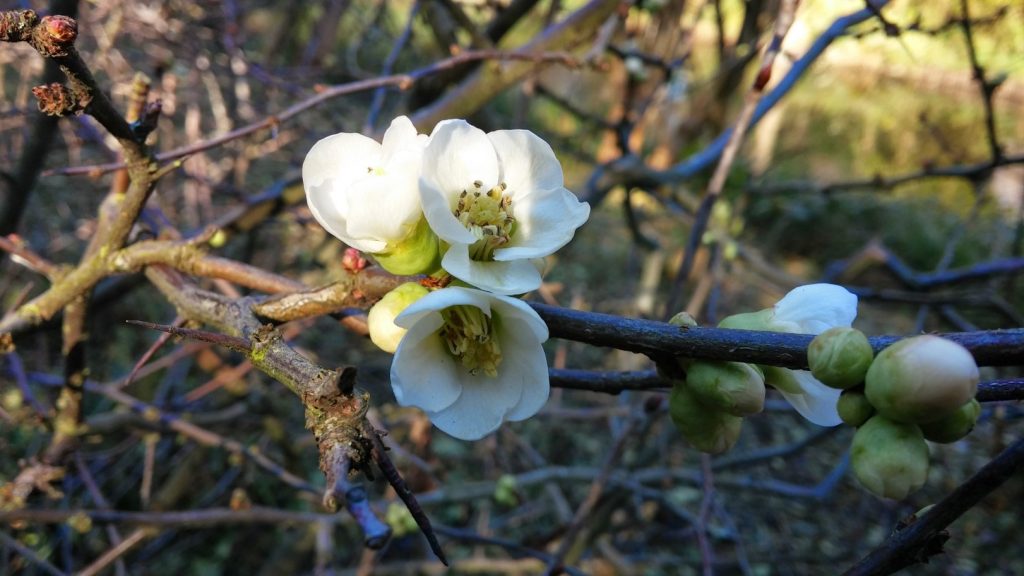
Wandsworth ‘council’ had approved an application for Formula E racing in the park. This is how we are sinking, we cannot keep a space in any way sacred. No one walks, and it’s OK to race cars around a park where birds are feeding their young. We are unable to repair the split between Eros and Psyche, our cultural contempt and fear of instinct has caused rupture and disturbance in our behaviour. Let us resolve to change this. As I write these words it is not surprising that I recall Rilke’s unequivocal demand, and just as he saw change to be the purpose of Art, so I see the need to change is here around us in the soul of the world. I close this piece with words more beautiful and immediate than any of mine.
Archaic Torso of Apollo
We cannot know his legendary head
with eyes like ripening fruit. And yet his torso
is still suffused with brilliance from inside,
like a lamp, in which his gaze, now turned to low,gleams in all its power. Otherwise
the curved breast could not dazzle you so, nor could
a smile run through the placid hips and thighs
to that dark centre where procreation flared.Otherwise this stone would seem defaced
beneath the translucent cascade of the shoulders
and would not glisten like a wild beast’s fur:would not, from all the borders of itself,
Rainer Maria Rilke
burst like a star: for here there is no place
that does not see you. You must change your life.
translated by Stephen Mitchell
If you have enjoyed this article then please consider sending me a donation to help with hosting costs.
